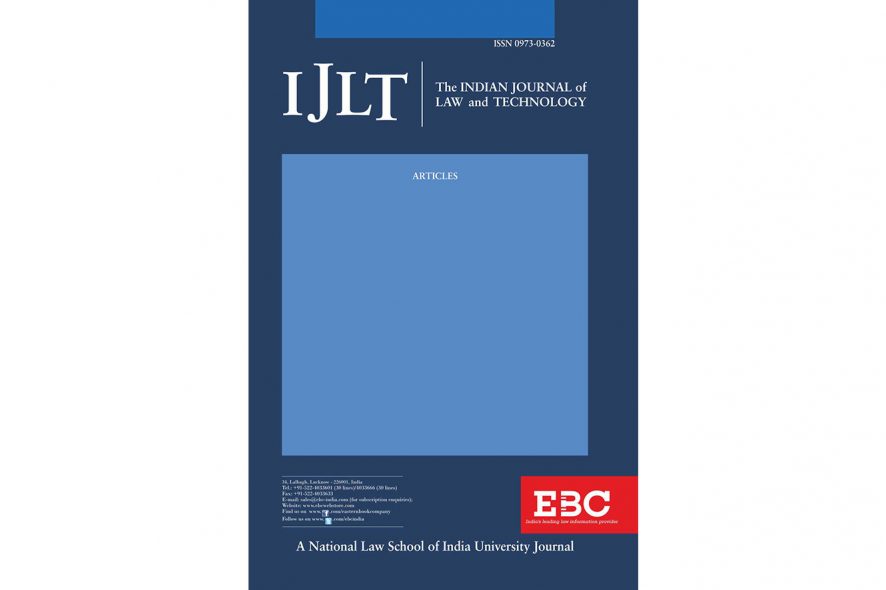The Indian Journal of Law & Technology (IJLT) is now accepting submissions for its upcoming special issue on Financial Technology (‘FinTech’). Please send in your submissions before February 28, 2022 in order for them to be considered.
India is one of the fastest growing markets for fintech in the world. Financial institutions have been one of the first business sectors to adopt widespread use of technology to innovate, improve services, increase financial inclusion and cut costs. The rapid growth in mobile and telecommunications services in recent years, coupled with strong government support, resulted in significant expansion of fintech in India. The corresponding legal and regulatory systems remain at a nascent stage.
This special issue aims to be a starting point for furthering the academic discourse around Fintech in the Indian context. Given the contemporary relevance of the topic, we invite submissions exploring the legal, technological and regulatory aspects of the various fintech products and services that are emerging in India and abroad.
Scope of the Special Issue:
Fintech is an umbrella term which includes all technological innovations with a bearing on financial services. Some of the suggested sub-themes are:
- Credit history
- Payment platforms
- Deposit/lending and capital raising
- Peer to peer lending and microfinance
- Investment management
This list is merely illustrative and all submissions falling within the broad ambit of Fintech are welcomed.
Authors are encouraged to adopt an interdisciplinary perspective and look into the socio-economic impact of fintech and regulatory proposals surrounding it.
Note: For scholars new to this field, a recommended starting point would be the Report of the Working Group on Fintech and Digital Banking published by the Reserve Bank of India in 2018. An illustrative article would be Prof. Deirdre Ahern’s article on Fintech Innovation and the Regulatory Sandbox, published in Vol. 15 (2019) of IJLT.
Categories of Submissions:
- Articles (5000-12000 words).
- Essays (3000-5000 words).
The above limits are exclusive of footnotes. Substantive footnoting is allowed.
Guidelines:
- Submissions must be submitted using this form.
- An abstract (not more than 250 words) must be submitted, concurrently with the manuscript.
- Submissions must be in English only.
- Co-authorship (up to a maximum of 3 authors) is permitted.
- The body of the paper shall be in Times New Roman, font size 12, 1.5 line spacing. Footnotes should be in Times New Roman, size 10 single line spacing.
- Kindly follow the OSCOLA (4th edition) style of citation.
- All submissions must be original, unpublished and not under consideration by any other journal/forum.
- Please send in your submissions in MS/Open Word (*.doc OR *.docx)
Deadline:
All submissions must be made on or before 11:59 p.m. IST, February 28, 2022. For any further queries, contact us at ijltedit@gmail.com.
About the Journal:
The Indian Journal of Law and Technology (IJLT) is a student-edited, peer-reviewed, open access law journal published annually by the National Law School of India University, Bangalore. Established in 2005, IJLT is the first and only law journal in India devoted exclusively to the study of the interface between law and technology. Since 2020, IJLT is a UGC-CARE indexed Journal.
The journal carries scholarship in the areas of intellectual property rights, internet governance, information communication technologies, privacy rights, digital freedoms, openness, telecommunications policy, media law, innovation, civil liberties and technology along with focusing on perspectives on contemporary issues involving the intersection of law, technology, industry and policy.
Previous issues have featured articles by distinguished authors such as Jonathan Zittrain (Harvard Law School), Yochai Benkler (Author of “The Wealth of Networks”), Justice Michael Kirby (High Court of Australia), Justice Pratibha Singh (Judge, Delhi High Court), Professor Stephen Hobe (International Institute of Space Law), Eben Moglen (Founder, Software Freedom Law Center), , Elonnai Hickok (Carnegie Endowment for International Peace), Dr. Carolyn Johnston (University of Melbourne), Tina van der Linden (Vrije Universiteit Amsterdam) and late Prof. Shamnad Basheer (Founder, SpicyIP).
The Journal is indexed on research databases such as HeinOnline, SCC Online. All our published articles are also available on our website as per our Open Access Policy.
For further information visit our website – https://www.ijlt.in/ .
Follow us on Twitter and LinkedIn for regular updates. For any further queries, contact us at ijltedit@gmail.com.







